| Central School Drama |
We know from old boys like John Dick and Arthur Redsell that drama was always a significant part of the School's annual life. Being a wholly boys' school, boys played the female parts in time-honoured Shakespearian tradition. Some of them were very pretty!!
During the War the school's Dramatic Section, motivated by Frank Winfield, achieved many notable productions at the Railway Institute. Arthur was proud to have been associated with the Drama group backstage because at one point it achieved six plays in a season. Frank eventually went to teach Drama professionally at Blackpool.
Roger Finney recalls the plays from 1953-58 as below. We want to fill in as many of the actors as possible. Each play has its own set of photographs (follow the hyperlinks). Read Roger's amusing musings on the School Play here.
Who do YOU remember? Email me!
|
Year |
Play |
Character |
Student |
| 1951 | Henry IV Part 1 | Sir John Falstaff | Graham Headworth |
| 1952? | The Honourable History of Friar Bacon and Friar Bungay | Friar Bacon | Graham Headworth |
|
1954 |
Shylock |
Hornsby |
|
|
1955 |
Shoemaker's Holiday |
|
|
|
1956 |
|
|
|
|
1957 |
See below |
|
|
|
1958 |
See below |
|
|
|
1959 |
A
Midsummer Night’s Dream |
Follow hyperlink |
Michael Buss |
| All the scenery below was painted by Joe Hawksby. Ron Cook directed all the plays. | |
| The Merchant of Venice | |
| From the left: John Etchells Dennis Ruston |
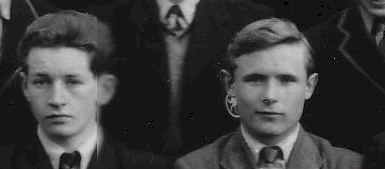 |
| Julius Caesar | |
 |
Here are just some of the cast: Front: Left to right: Portia (Buss); Lacey, Lockyer (Brutus); NK, Stonehouse, NK, NK. Back: Booth (Rt of Stonehouse), far Rt - Trevor Dunkerley.
Mark Anthony was Stonehouse (pictured below in Roger's article) |
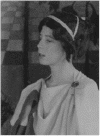 |
Yeah, well that's me. |
 |
Brutus and Portia (Lockyer and Buss) |
 |
Detail (Lockyer and Buss) |
 |
Ron Cook's Thank You note. |
| The Tempest | Directed by Ron Cook |
| Tony Warwick played Caliban Roger Finney played Gonzalo John Simpkin played Francisco (to be confirmed) Booth played either Trinculo or Stephano |
|
 |
Hmm. That's Buss (centre) and John Richard's as Ariel (right). But who is the brunette? |
 |
Same characters as above with Lockyer (right) as Prospero |
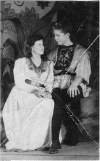 |
So who exactly was I dating? |
| Twelfth Night | Directed by Ron Cook |
 |
Cast picture. Okay - who can supply the names?
Roger Finney thinks: |
 |
And here is Roger Finney (left) as Malvolio. |
 |
Notice the Hawksby scenery. |
 |
|
 |
Alistair McAfee (left) wields his sword. One night Booth (center) leaned on his sword, as here, and it slid through a hole in the floor. It was a very funny, unscripted moment. |
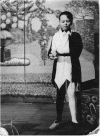 |
John Richards as the cute Feste. Hawksby scenery. |
 |
|
 |
"Is that the meaning of accost?" |
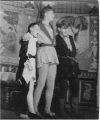 |
|
 |
Best wishes for Xmas 1957 from R. J. Cook |
Roger Finney muses
about the School Play
(Roger was at the school from
1953-1958. He is pictured, below, in his first year.
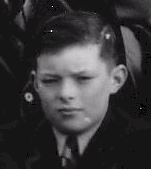 |
The
first play that I took a part in at Central School was Julius Caesar by
Shakespeare. The School Play, as it was known, was also the Shakespeare
play which was the set play in the G.C.E. English Literature paper for
that year. Thus actors who were in the Fifth year really got to know the
script well. I had the small part of Caius Ligarius, and I was also the Prompter. We did not actually perform the whole play as it was originally written by the bard; we did the Ron Cook sanitised version. Ron went carefully through the play and took out all the potentially naughty bits. |
There was usually one master copy of the play which Ron Cook edited, and this was copied up into several other editions which the actors kept for themselves. The Prompter had the master copy which Ron released during the performance only.
The curtained stage was a home made affair and the theatre was the form rooms for 2X and 2A which were joined by removing the sliding partition. The stage was there all the year and it was from there that Assembly was conducted by Boss.
| The lighting was installed by Dennis Chapman (right), the Engineering Drawing teacher, and someone else. The stage decoration, the wings and the back wall were the inspired work of Joe Hawksby. For Julius Caesar, plaster of Paris moulds were made for each actor who had to wear a Roman Breastplate, and Joe Hawksby did this too, with the actors having to stand in the Art Room in their swimming trunks while Joe bound them up in plaster of Paris. As it set he cut the back away leaving a perfectly moulded breastplate which he later decorated. It looked very much like the real thing. |
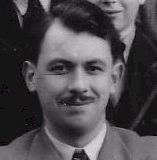 |
Rehearsals were done mostly in school time (which was a great skive, I recall) and occasionally in the evening at Pear Tree School where Ron did some evening classes. There Miss Waring would be involved. Built more for comfort than speed she was a delightful lady. She taught at Pear Tree Infants and I recall that she read stories to the class in a wonderful way (I attended Pear Tree Infants from 1946). She was also in charge of make-up and costumes when the production s took place.
Anyway, back to the play.
On the night the play took place the Prompters position was on the right hand side of the stage under a light bulb which was used as a reading light in order to follow the script. There was however a weakness in the system. The bulb was part of the stage lighting circuit - which was fine when the stage was fully lit - but when the lights dimmed so did the prompting bulb. When it was very dark on stage the book was completely unreadable, and the play, which was difficult to follow because of Ron’s scribble, impossible to follow. Next two nights you took a torch.
|
John
Stonehouse (right) was Mark Anthony and he played this part with
real menace. I recall one night that he strode to the edge of the stage and clenched his fist and shouted to the audience “Woe to the hand that cost this shedly blood!” Everybody backstage collapsed, but the audience were quite unaware however. I have often mused if they would have appreciated it better if Stonehouse had shouted “Woe to the hand that cost this bloody shed!” |
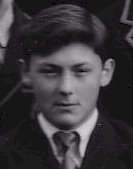 |
The school play also brought out the innate dirty humour which seemed to be ever present.
One year there was a character called Dickon in the play. Maybe the play was Shoemakers Holiday, I am not sure. It became a sort of game when one lad would say to another “It’s a thickun Dickon!“ to which the reply was always “It’s a nastyun Sebastian”.
Roger Finney, March 13th, 2005